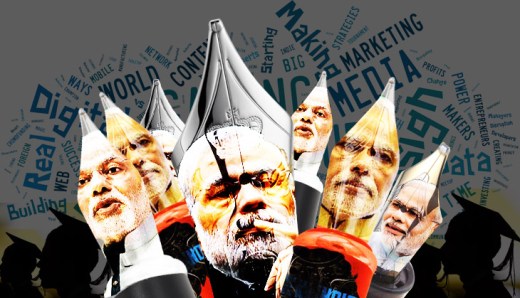The question of what Outcome 2015 would have been had he not been projected as PM will continue to haunt the party.
The series of scams that has rocked the BJP in recent weeks, from Lalitgate to Vyapam, from Pankaja Munde to Raman Singh, have left one deafening question in their wake: Why is Prime Minister Narendra Modi silent? The man who rose to victory in last year’s Parliamentary elections on the promise of a corruption-free government now lords it over a party steeped in murkiness of the highest order. Why has he not spoken about it? Why has he not taken any action?
Critics of Modi point to his repeated insinuations against then Prime Minister Manmohan Singh, who had also maintained a steady silence as his government battled a slew of corruption allegations. What is the difference between Singh and him, they ask. Their questions are all the more urgent because unlike Singh, who was beholden to the Gandhis for his power, Modi faces no such dilemmas.
This argument – that Modi controls the BJP absolutely today – is generally forwarded as a positive. Indeed it is presented with all the more vigour now because it makes it incumbent upon him to take some action. But recent weeks may have begun to expose the chinks in this line of thinking. True, Modi does exercise absolute control but it is worth asking how this came to be, and what deleterious effects, if any, this has had for the BJP.
Modi’s ascension has hardly been the steadily rising gradient that politicians in India are required to tread. His thumping majority looks rather like a blitzkrieg, comparable with that of Rajiv Gandhi in 1984. That said, there is another similarity between the two men. Both men appeared from relative national insignificance to stake their claim to national leadership.
Yes, Modi had been a chief minister in Gujarat for a decade before he came to the centre. But like Gandhi whom progeny favoured, Modi’s claim to the top spot also had a singular extenuating circumstance: the RSS’s unquestioned backing. Take that out of the equation, and he was as good as the next leader, which list includes central leaders like Sushma Swaraj and Rajnath Singh, or state leaders like Shivraj Singh Chauhan and Raman Singh. (Curiously, three of these four names are under the scanner now.)
Some might say that Modi rode to victory on the dint of his work in Gujarat but the truth is the Gujarat model has been repeatedly questioned for its viability, especially for its ability to work for all strata of society. As the still-unreleased Rapid Survey on Children report, jointly compiled by the UN and government of India, shows, Gujarat under Modi showed worse than average national indicators for stunting and wasting among children. If we are to look, rather, towards Modi’s clean record and Gujarat’s impressive industrial growth during his tenure, we must remember that before the current cycle of scams, both Shivraj Chauhan and Raman Singh were also hailed as great administrators, and in areas such as agriculture and PDS where they have arguably had a greater beneficial effect than Modi did in Gujarat.
Victory 2015 was, therefore, a battle of wits as much as one of inherent strength, and while the Modi juggernaut proved invincible, equations within the party could not have changed as dramatically. Especially in the way LK Advani and Murli Manohar Joshi were sidelined after May 2015, there would doubtless be bad blood in the party over Modi’s bloodless coup. (Modi’s reactions to his anointment –bowing his head on the ramparts of Parliament and losing his composure during his first address to the BJP Parliamentary Board – reinforce the perception that even he realised that he had gotten lucky.)
The current scam saga is a direct fallout of that bad blood. I am not sure how many of these leaks and revelations have to do with internal party politics but I can vouch that Modi has not been able to take others on because he lacks the moral authority to do so. He was one of them until the other day, and until the other day, he had gone through neither a long innings in national life like Sushma Swaraj, nor turned around his party’s fortunes like LK Advani did in the 1990s. Yet, his emphatic victory in 2015 brushed aside everything in its giant wave, and the party must now contend with the detritus.
Modi is looking to run a government that he hopes will remain untouched by the larger currents convulsing the BJP. That is a laughably dim hope, but his behavior so far gives no reason to believe otherwise. In the weeks since the scams started breaking, he has launched the Digital India initiative, shared sweet-nothings on his radio show Mann ki Baat, and is now away on a foreign trip. He really believes that he can ride out this storm on the dint of his popularity and personal integrity, but he is wrong.
That said, he can do little else. There is no question that had Advani still been a force to reckon with in the party, something would have been done about the spate of scams that have come to light. But like other leaders of repute within the BJP of yore, the grand old man is reduced to making noises from the sidelines.
The popular vote is (rightly) a tool of legitimacy in our country. On that count, Modi proved himself in 2015. But the question of what Outcome 2015 would have been had he not been projected as prime minister will continue to haunt the BJP. Would people, sick of the UPA’s corruption, have voted for the BJP regardless of who was in charge? We cannot say.
What we can say is that Modi’s rise looks less earned than devised, and the BJP is paying the price of that difference.
http://www.dailyo.in/politics/modi-vyapam-lalit-modi-bjp-government-scam-silent/story/1/4812.html

Leave a Reply